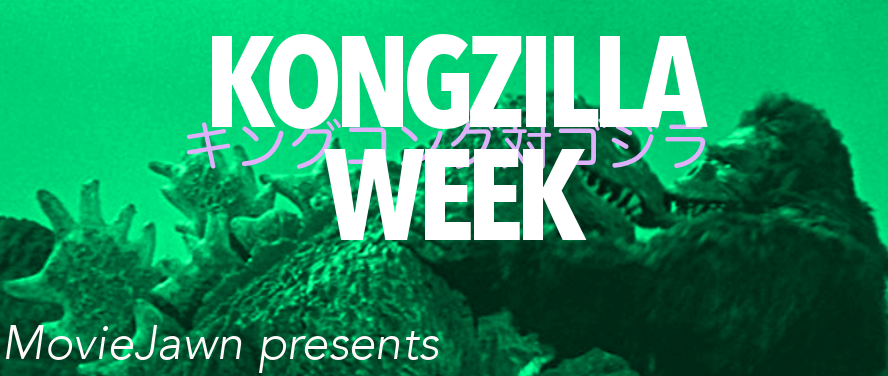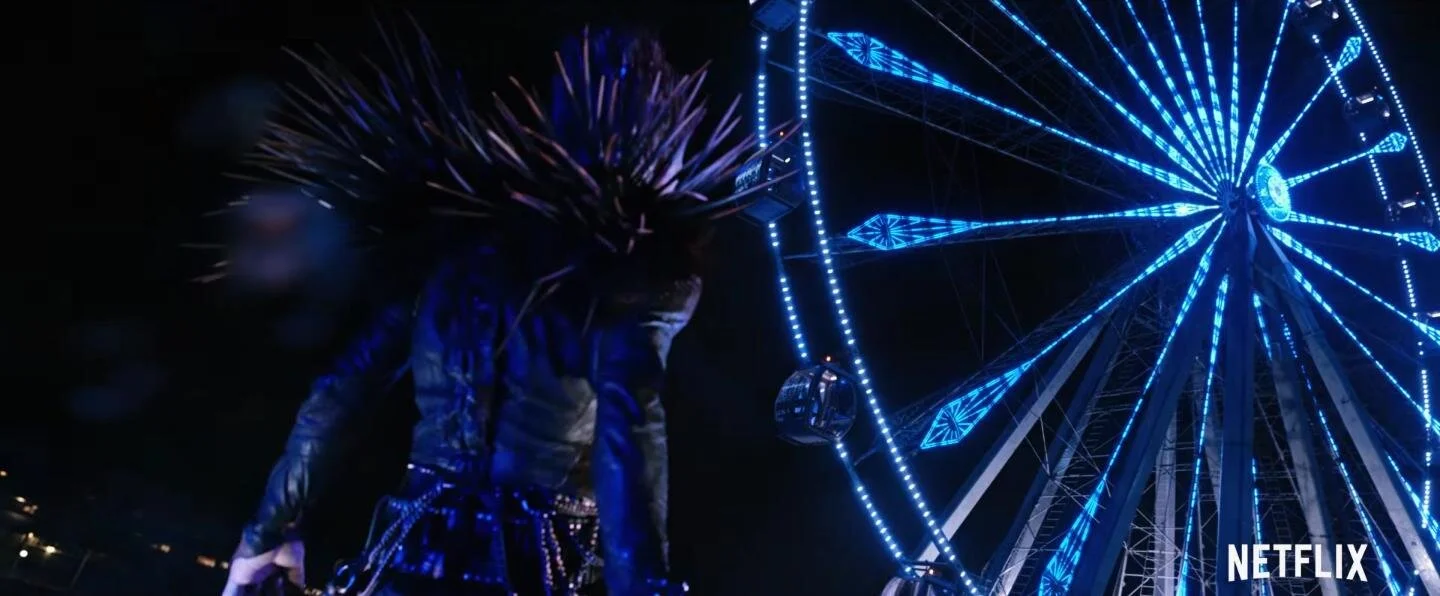Kongzilla Week: What to expect when you're expecting...a new Adam Wingard movie?
All week long, we’re celebrating the clash of the titans that is Godzilla vs. Kong! It’s Kongzilla Week! Read all of the pieces here!
by Garrett Smith, Contributor
To say I am an Adam Wingard fan is a bit of an understatement. I first encountered him when You're Next, his home-invasion/slasher hybrid, was first streaming on Netflix. His V/H/S series would end up there and I would devour that as well. All of which would lead me to a Philadelphia Film Festival screening of what has become an all-time favorite of mine, The Guest. I have followed his career enthusiastically since then, very much enjoying how he puts his stamp on every property he takes on, which has included Blair Witch, Death Note, and the upcoming Godzilla vs. Kong. But what is Adam Wingard’s "stamp"?
GENRE & SUBVERSION
Genre is very important to Wingard, as genre provides a set of guidelines for a movie. A home-invasion movie, for instance, requires a family that the audience perceives to be "normal" and an individual or group of invaders that upset this normalcy. These movies tend to be bleak and upsetting in that there’s often no escaping for the family. This is where Wingard (and his screenwriter Simon Barrett, who deserves a lot of credit here as well) find their subversive "in" for You're Next, where the "normal" family is a bickering, toxic lot that contribute to their own demise and the invaders are bumbling dipshits that meet their match in an unexpected houseguest–one of the family member’s girlfriends. And thus what you assume will be a harrowing and difficult experience is also a fun one.
In Wingard’s movies, genre is important because he can surprise the audience by subverting its tropes. His ability as an artist to convince you that he’s just following the typical "style guide" for a particular genre makes these moments of subversion really pop, like in The Guest when it shifts into a different genre entirely without betraying the overall tone of the movie. This element of surprise is a major key to his success as an entertainer and storyteller.
BRIGHT LIGHTS & CANDY COLORS
I spent some time over the past few weeks digging into Wingard’s early shorts and independent features (many of which can be found online in various places like this YouTube channel that may or may not be his). They reveal a very creative young filmmaker that has a natural talent for rhythmic editing and atmospheric sound design, some other key components of his filmography. But what grabs me most about them is his ability to turn "nothing" into production design. In an early interview I found, he says his best advice for independent filmmakers is to make any limitations seem like choices, so the audience is never aware of those limitations. In his earliest work, he’s often shooting in a local basement with a cheap camera, a couple of friends, and nothing but some Christmas lights. Yet what you are watching has these beautiful, kind of psychedelic moments thanks to some crafty focus pulling on those lights. This technique shows up a lot throughout his shorts, like here in Ultra Modern, and is used to great effect in one of his early features, A Horrible Way to Die, where the lights are used to evoke specific moods between the leads.
He goes on to use wilder lighting and color schemes, perhaps most notably in the finale of The Guest, which takes place in a Halloween maze built inside a High School gymnasium (ya know, as you do). Although my favorite example of this in his work thus far is when Light first meets Ryuk in Death Note and all sorts of candy-colored classroom objects get thrown across the screen. There’s a slight surreality implied here that all of his movies have. His creative choices evoke that surreality while the surreality itself allows us to buy into those choices. It’s an ouroboros of world-building, where one cannot exist without the other, and one of the more remarkable components of his movies.
SYNTHESIZERS & BALLADS
Adam Wingard is vaporwave. If you love the score for Stranger Things, you can pretty much thank Wingard for that! Wngard used music from composers Kyle Dixon and Michael Stein’s band S U R V I V E in The Guest, introducing them to genre fans like myself at pretty much the exact moment John Carpenter’s music became a frequent reference point for genre movies. Like many of us, Wingard loves a good synthesizer music cue, and I would personally argue that he uses them more effectively than most of his peers, making them feel like part of the world of his movies rather than winking nods to the genre itself.
But what really sets him apart from his peers for me is his use of what I will label "cheesy ballads" right alongside those synth stings. From the ever repeating "Looking for the Magic" by Dwight Twilley Band that features prominently in You're Next, to The Guest’s finale which uses Annie’s "Anthonio" to genuinely explosive effect, through his most recent climax in Death Note where Light and Mia’s fate dangle before our eyes to "I Don’t Wanna Live Without Your Love" by Chicago; Wingard loves a song choice that feels anachronistic to the scene you’re watching but actually reveals a romantic streak in his work. He loves his characters. And I think he loves their tragedy, too.
I only call these ballads "cheesy" because I think we’re not used to seeing them used in the way Wingard uses them. We expect these songs to soundtrack John Hughes moments, not grimly humorous death scenes. The dichotomy at play in our expectation versus our experience of these songs in his movies makes them "cool" in some sense, and I really like that reclamation of this music, even if that may not be his actual intention (I would not be surprised if he called all of what I just wrote "bullshit" and simply thinks of these choices as "tongue-in-cheek").
HUMOR & WEIRDNESS
To take a phrase from Griffin Newman (host of the podcast Blank Check), Adam Wingard is "a little stinker." He’s got a sly sense of humor that tends to creep up on you in his movies. As early as his short film 1000 Year Sleep, he’s been telling stories that initially appear self-serious only to reveal a kind of sinister humor in their final moments that’s been running underneath the whole time. The Guest is one of my favorite examples of this in his movies, but it was finally getting to see A Horrible Way to Die that really solidified this as a unifying theme across his movies. He carries this joke out for *so* long in that movie, not revealing its punchline and sense of humor until the last scene of the movie. But what I like about his movies so much is these “reveals” don’t undermine the drama of what came before–he takes his characters and their drama very seriously, even if he finds them and their predicaments funny. Things matter to his characters, and he takes that seriously, even if he thinks they’re stupid and/or funny.
And what he finds funny is usually pretty weird. There’s a scene in The Guest where a man we know to be a violent killer is carving pumpkins with a teenager, and in the most wholesome way possible the killer gives the teenager the following advice:
"Never let anyone pick on you. Otherwise you’ll carry it with you the rest of your life. Those kids at school, they’re bigger than you? Then bring a knife to school. They take it off you and beat you up? You go around their houses at night and burn them down with their families inside - what’s the worst they can do?"
In full view of the movie this scene is so fucking funny, but in the moment it’s played totally straight and sincere, and feels almost heartwarming, were it not for the other insane details we’re already aware of. This kind of tonal-hopping that Wingard manages in his movies allows them to be very strange, and full of weird characters and moments that really tickle my sense of humor. It’s an aspect of his work that I really appreciate and I think is perhaps missed in some critiques of his output, especially regarding Death Note (which I personally think is really funny and kind of cutthroat about its subject).
WHAT TO EXPECT IN GODZILLA VS KONG
So this all leads me to being extremely stoked for Godzilla vs Kong. Not only am I an Adam Wingard fan, if you’ve read any of my prior work you’ll know I’m an enormous Godzilla fan as well. And it just so happens one of the things I enjoy about Godzilla is how malleable he is as a character, and how strange and weird his movies can be. I imagine this is one of the things that attracted Wingard to this project, and indeed the early trailers indicate he was able to put his stamp on MY BEST BIG BOY in a big, bad way. You’ve got that neon cityscape that Godzilla and Kong appear to duel in, as well as apparently pretty big personalities for our two leads themselves. Even the music the trailer is cut to has big synth swells in it and feels like a choice he may have had a hand in.
If I had to take a crack at just what we might get at home and on the big screen this coming week, I’d assume this will lean into more of the science-fiction aspects of some of the old Toho movies. My guess is that Godzilla: Final Wars is one of Wingard’s favorite Goji movies and that he may be swinging this universe in a more expressly weird direction. In fact, I think he likes to subvert expectations so much that he may go full bonkers-bananas on us and do something really ridiculous like repeat the plot from the original Godzilla vs. Mechagodzilla and give us a Buffalo Bill-esque MechaG that’s wearing a Godzilla skin suit (if you don’t know what I mean, Jun Fukuda’s movie is currently streaming on Criterion Channel and HBO Max!). Or, perhaps he’ll break out an old Toho/Rankin Bass character in Mechani-Kong from King Kong Escapes to wreak some havoc! I am convinced we are going to get some unexpected characters like this and that by the end, Godzilla and Kong will need to team up to defeat a greater threat.
But what I really HOPE will be Wingard’s stamp on this series is that in the end we get very atmospheric, foggy shots of Godzilla and Kong making eyes from across a city. And as "In The Air Tonight" by Phil Collins plays, our BIG BOYS circle each other in slow motion, grunting and snorting, until finally they collide in an embrace as that famous drum fill finally lands. And then they can bodyslam each other or whatever, I just want one very Adam Wingard moment of sexy monster boys - is that so much to ask!?
As a little bonus for anyone that has made it this far, I think you can see a nice synthesis of everything above in what I believe is his only music video credit - "Salt Over My Shoulder (Silly Superstition)" by The Dash Inbetween.
Read more of Garrett’s MovieJawn writing here.







